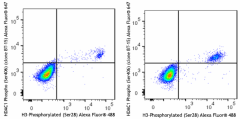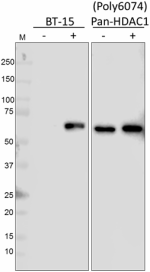- Clone
- BT-15 (See other available formats)
- Regulatory Status
- RUO
- Other Names
- Histone Deactylase 1, RPD3L1
- Isotype
- Mouse IgG2b, κ
- Ave. Rating
- Submit a Review
- Product Citations
- publications

-

Untreated HELA cells (left) and HELA cells treated with Nocodazole for 24 hours (right), were fixed, permeabilized with True-Phos™ Perm Buffer, and then stained with anti-HDAC1 Phospho (Ser406) (clone BT-15) Alexa Fluor® 647 and anti-Histone H3-Phosphorylated (Ser28) (clone HTA28) Alexa Fluor® 488. -

Untreated HeLa cells (left) and HeLa cells treated with Nocodazole for 24 hours (right), were fixed, permeabilized with True-Phos™ Perm Buffer, and then stained with anti-HDAC1 Phospho (Ser406) (clone BT-15) Alexa Fluor® 647 and DAPI.
| Cat # | Size | Price | Quantity Check Availability | Save | ||
|---|---|---|---|---|---|---|
| 611009 | 25 tests | $183 | ||||
| 611010 | 100 tests | $382 | ||||
Histone Deacetylase 1 (HDAC1) plays a critical role in various cellular processes, including cell cycle progression, proliferation, and differentiation. The enzyme functions by removing acetyl moieties from histone targets, resulting in histone compaction and alterations in nucleosomal positioning. Aurora kinases phosphorylate HDAC1 at Ser406 during prophase, immediately after cells begin mitosis, resulting in reduced deacetylase activity of HDAC1. This modification plays an essential role in regulating cell cycle progression, as well as controlling the expression of genes involved in central nervous system development.
Product DetailsProduct Details
- Verified Reactivity
- Human, Zebrafish
- Antibody Type
- Monoclonal
- Host Species
- Mouse
- Immunogen
- Synthetic peptide corresponding to human HDAC1 phosphorylated at Serine 406
- Formulation
- Phosphate-buffered solution, pH 7.2, containing 0.09% sodium azide and BSA (origin USA)
- Preparation
- The antibody was purified by affinity chromatography and conjugated with Alexa Fluor® 647 under optimal conditions.
- Concentration
- Lot-specific (to obtain lot-specific concentration and expiration, please enter the lot number in our Certificate of Analysis online tool.)
- Storage & Handling
- The antibody solution should be stored undiluted between 2°C and 8°C, and protected from prolonged exposure to light. Do not freeze.
- Application
-
ICFC - Quality tested
- Recommended Usage
-
Each lot of this antibody is quality control tested by intracellular immunofluorescent staining with flow cytometric analysis. For flow cytometric staining, the suggested use of this reagent is 5 µL per million cells in 100 µL staining volume or 5 µL per 100 µL of whole blood. It is recommended that the reagent be titrated for optimal performance for each application.
* Alexa Fluor® 647 has a maximum emission of 668 nm when it is excited at 633 nm / 635 nm.
Alexa Fluor® and Pacific Blue™ are trademarks of Life Technologies Corporation.
View full statement regarding label licenses - Excitation Laser
-
Red Laser (633 nm)
- Application Notes
-
When tested for western blot, this clone produced a band that showed a ~1-3 kD mass shift compared to a pan HDAC1 antibody. This observation is consistent with a previous study of the HDAC1 Phospho (Ser406) site.
This clone recognizes zebrafish HDAC1 phosphorylated at Ser4062.
Clone BT-15 cross-reacts to Zebrafish2 -
Application References
(PubMed link indicates BioLegend citation) -
- Segre CV, et al, 2016. mAbs. 8: 37-42
- Loponte S, et al, 2016. Sci Rep, 6: 30213.
- RRID
-
AB_2910487 (BioLegend Cat. No. 611009)
AB_2910487 (BioLegend Cat. No. 611010)
Antigen Details
- Structure
- HDAC1 is a 482 amino acid protein with a predicted molecular weight of 55 kD.
- Distribution
-
Nucleus/Ubiquitously expressed
- Function
- Phosphorylation of HDAC1 Ser406 results in reduced deactylase activity of the enzyme.
- Biology Area
- Cell Biology, Cell Cycle/DNA Replication, Chromatin Remodeling/Epigenetics
- Molecular Family
- Nuclear Markers, Phospho-Proteins
- Antigen References
-
- Segre CV, et al, 2016. mAbs. 8: 37-42.
- Loponte S, et al, 2016. Sci Rep, 6: 30213.
- Gene ID
- 3065 View all products for this Gene ID
- UniProt
- View information about HDAC1 Phospho Ser406 on UniProt.org
Related Pages & Pathways
Pages
Related FAQs
Other Formats
View All HDAC1 Phospho (Ser406) Reagents Request Custom Conjugation| Description | Clone | Applications |
|---|---|---|
| PE anti-HDAC1 Phospho (Ser406) | BT-15 | ICFC |
| Purified anti-HDAC1 Phospho (Ser406) | BT-15 | WB,ICFC |
| Alexa Fluor® 488 anti-HDAC1 Phospho (Ser406) | BT-15 | ICFC |
| PE/Cyanine5 anti-HDAC1 Phospho (Ser406) | BT-15 | ICFC |
| Alexa Fluor® 647 anti-HDAC1 Phospho (Ser406) | BT-15 | ICFC |
Compare Data Across All Formats
This data display is provided for general comparisons between formats.
Your actual data may vary due to variations in samples, target cells, instruments and their settings, staining conditions, and other factors.
If you need assistance with selecting the best format contact our expert technical support team.
-
PE anti-HDAC1 Phospho (Ser406)

Untreated HeLa cells (left) and HeLa cells treated with Noco... 
Untreated HELA cells (left) and HELA cells treated with Noco... -
Purified anti-HDAC1 Phospho (Ser406)

Whole cell extracts (15 µg protein) from HeLa cells untreate... 
Untreated HELA cells (left) and HELA cells treated with Noco... 
Untreated HELA cells (left) and HELA cells treated with Noco... -
Alexa Fluor® 488 anti-HDAC1 Phospho (Ser406)

Untreated HeLa cells (left) and HeLa cells treated with Noco... 
Untreated HELA cells (left) and HELA cells treated with Noco... -
PE/Cyanine5 anti-HDAC1 Phospho (Ser406)

Untreated HeLa cells (left) and HeLa cells treated with Noco... 
Untreated HELA cells (left) and HELA cells treated with Noco... -
Alexa Fluor® 647 anti-HDAC1 Phospho (Ser406)

Untreated HeLa cells (left) and HeLa cells treated with Noco... 
Untreated HELA cells (left) and HELA cells treated with Noco...

 Login/Register
Login/Register 












Follow Us